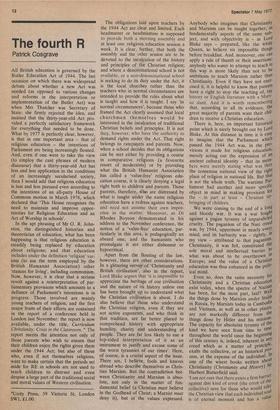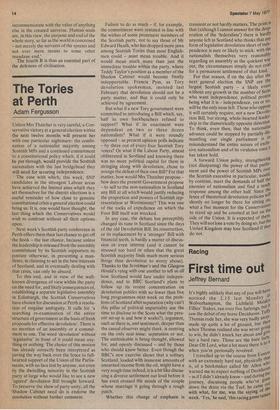The fourth R
Patrick Cosgrave
All British education is governed by the Butler Education Act of 1944. The last occasion on which there was widespread debate about whether a new Act was needed (as opposed to various changes and reforms in The interpretation or implementation of the Butler Act) was when Mrs Thatcher was Secretary of State: she firmly rejected the idea, and insisted that the thirty-year-old Act provided a perfectly satisfactory framework far everything that needed to be done. What by 1977 is perfectly clear, however, is that in one important area — that of religious education — the intentions of Parliament are being increasingly flouted. And, even if one were to take the view (to employ the cant phrases of modern discourse) that a thirty-year-old Act has less and less application in the conditions of an increasingly secularised society, then I would add that religious education is less and less pursued even according to the intentions of an all-party House of Commons motion in March 1976, which declared that 'This House recognises the need to maintain and improve opportunities for Religious Education and an Act of Worship in schools'.
In the apt phrasing of Mr 0. R. Johnston, the distinguished historian and theoretician of education, 'what has been happening is that religious education is steadily being replaced by education about religions; and that education includes under the definition 'religion' various (to use the term employed by the British Humanist Association) other 'stances for living', including communism. Now, however, it is clear that a serious revolt against a reinterpretation of parliamentary provisions which amounts to a defiance of Parliament's intentions is in progress. Those involved are mainly young teachers of religion, and the first major fruits of their efforts are contained in the report of a conference held in London last November: the report is now available, under the title, Curriculum Christianity: Crisis in the Classroom. * The report merits the attention not only of those parents who wish to ensure that their children enjoy the rights given them under the 1944 Act; but also of those who, even if not themselves religious, want to make certain that the periods set aside for RE in schools are not used to teach children to distrust and even despise a large part of the traditional social and moral values of Western civilisation. The obligations laid upon teachers by the 1944 Act are clear and limited. Each headmaster or headmistress is supposed to provide both a morning assembly and at least one religious education session a week. It is clear, further, that both the assembly and the other session are to be devoted to the inculcation of the history and principles of the Christian religion; and where a denominational school is not available, or a non-denominational school is seeking to do its duty under the Act, it is the local churches rather than the teachers who in normal circumstances are intended to provide the rules about what is taught and how it is taught. I say 'in normal circumstances', because those who framed the Act clearly assumed that local churchmen themselves would be interested in the inculcation of traditional Christian beliefs and principles. It is not they, however, who have the authority to demand rights under the Act. That right belongs to ratepayers and parents. Now, when a school decides that its obligations can be met either by providing a course in comparative religions (a favourite resort of modernists) or by providing what the British Humanist Association has called a 'value-free' religious education course, it is clearly denying a legal right both to children and parents. Those parents, therefore, who are distressed by what is taught under the name religious education have a redress against teachers, and need not assume their own impotence in the matter. Moreover, as Dr Rhodes Boyson demonstrated in his address to the November conference, the notion of a 'value-free' education, particularly in this area, is pedagogically an absurd one; and the humanists who promulgate it are either dishonest or hypocritical.
Apart from the flouting of the law, however, there are other considerations. In a glittering survey of 'Christianity and British civilisation', also in the report, Lord Blake argues that It is impossible to appreciate the heritage of our civilisation and the nature of its history unless one has been brought up to understand what the Christian civilisation is about. I do also believe that those who understand the Christian religion, even if they are not active exponents, and who think in that tradition, are far better placed to comprehend history with appropriate humility, charity and understanding of people. They are far less likely to use a lop-sided interpretation of it as an instrument to justify and excuse some of the worst tyrannies of our times'. Here, of course, is a crucial aspect of the issue. There are, I believe, fools and knaves abroad who describe themselves as Christian Marxists. But the contradiction between Christianity and Marxism is absolute, not only in the matter of fundamental belief (a Christian must believe in the Godhead of Christ; a Marxist must deny it), but in the values expressed. Anybody who imagines that Christianity and Marxism can be taught together, as fundamentally aspects of the same subject, and with objectivity is — as Lord Blake says — prepared, like the white Queen, to believe six impossible things before breakfast. And, moreover, one can apply a rule of thumb or their assertions: anybody who wants to attempt to teach in this way is more likely than not to be ambitious to teach Marxism rather than Christianity. Even if they have not exercised it, it is helpful to know that parents have a right to stop the teaching of, saY history or English literature with a Marxist slant. And it is worth remembering that, according to all its evidence, the great majority of parents want their children to receive a Christian education. , There is, here,, an important histories' point which is nicely brought out by Lord Blake. At this distance in time it is cal to imagine that •the Parliament whim passed the 1944 Act was, in the provisions it made for religious education, merely acting out the expression of an ancient cultural identity — that its mat" bers were merely stating what was then the consensus national view of the right place of religion in national life. But that is not the whole truth. The wartime Par. liament had another and more specific object in mind in making provision for the — in part at least — Christian lir bringing of children. We were coming to the end of a long and bloody war. It was a war fought against a pagan tyranny of unparalleled cruelty. The paganism of the Nazi creed was, by 1944, uppermost in nearly everY mind, and its barbarity was — rightly, ill my view — attributed to that paganisnl' Christianity, it was felt, constituted the sole moral and intellectual barrier W what was• about to be overthrown in Europe; and the value of a Christian education was thus enhanced in the political mind.
Even so, does the same necessity for Christianity and a Christian education exist today, when the spectre of Naz1st11„ has been, for the most part, laid? W. the things done by Marxists under Stalin in Russia, by Marxists today in Cambodia and Vietnam, as well as in other places' are not markedly different from the things done by Hitler and his minions' The capacity for absolutist tyranny of the kind we have seen from time to time throughout the world since the beginning of this century is, indeed, inherent in all creed which as a matter of princiPle, exalts the collective, or an historical pr°' cess, at the expense of the individual. one of the wisest books written abol!' Christianity (Christianity and History) Sir Herbert Butterfield said: 'I am not sure that there exists a firm barrier against this kind of error (the error of the collective) save for those who would take, the Christian view that each individual sone' is of eternal moment and has a vahl
incommensurate with the value of anything else in the created universe. Human souls are, in this view, the purpose and end of the whole story, so far as the world is concerned — not merely the servants of the species and not ever mere means to some other mundane end.'
The fourth R is thus an essential part of the defences of civilisation.







































 Previous page
Previous page